-
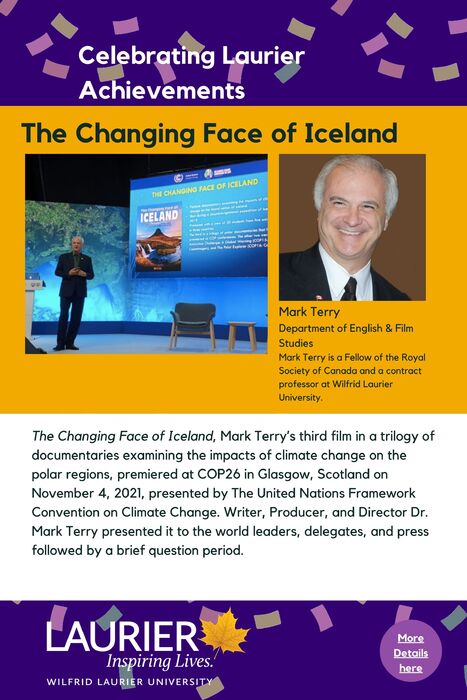 The Changing Face of Iceland
The Changing Face of Iceland The Changing Face of Iceland, Mark Terry’s third film in a trilogy of documentaries examining the impacts of climate change on the polar regions, premiered at COP26 in Glasgow, Scotland on November 4, 2021, presented by The United Nations Framework Convention on Climate Change. Writer, Producer, and Director Dr. Mark Terry presented it to the world leaders, delegates, and press followed by a brief question period.
-
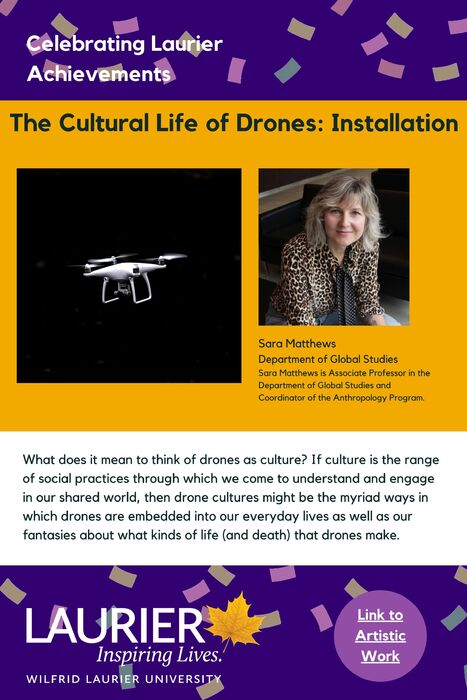 The Cultural Life of Drones: music and installation
The Cultural Life of Drones: music and installation What does it mean to think of drones as culture? If culture is the range of social practices through which we come to understand and engage in our shared world, then drone cultures might be the myriad ways in which drones are embedded into our everyday lives as well as our fantasies about what kinds of lives that drones make.
-
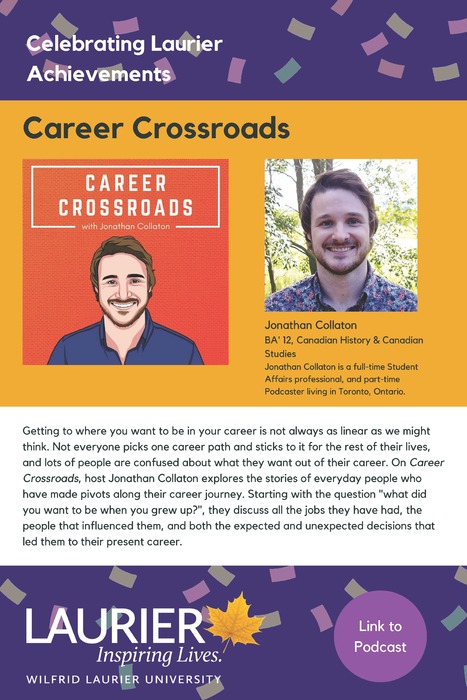 Career Crossroads
Career Crossroads Getting to where you want to be in your career is not always as linear as we might think. Not everyone picks one career path and sticks to it for the rest of their lives, and lots of people are confused about what they want out of their career. On Career Crossroads, host Jonathan Collaton explores the stories of everyday people who have made pivots along their career journey. Starting with the question "what did you want to be when you grew up?", they discuss all the jobs they have had, the people that influenced them, and both the expected and unexpected decisions that led them to their present career.
-
 Hard Road to Victory: The Chatham All-Stars Story
Hard Road to Victory: The Chatham All-Stars Story This historical nonfiction children's book tells the story of the 1934 Chatham All-Stars. This team of all-Black athletes competed for and won the Ontario baseball championships 13 years before Jackie Robinson broke the colour barrier.
-
 Shadow Boxing and Other Bizarre Adventures of a Blind Girl
Shadow Boxing and Other Bizarre Adventures of a Blind Girl When I was thirteen years old, I found out that I was slowly going blind. In 1999, I was diagnosed with a degenerative, genetic eye condition called Retinitis Pigmentosa. This condition will leave me mostly, if not completely, blind. As a teenager who felt I could see fine, going blind felt far away. Now, at age thirty-two, I have lost the majority of my peripheral vision and going blind feels anything but far away. If you are going blind and wonder how in the hell you are supposed to cope with this, my story is for you. If you love someone who is going blind and wish that you knew how to help in some way, my story is for you.
-
 Older Sister. Not Necessarily Related
Older Sister. Not Necessarily Related Winner of the 2019 Hilary Weston Writers' Trust Prize for Nonfiction A beautiful and haunting memoir of kinship and culture rediscovered. Jenny Heijun Wills was born in Korea and adopted as an infant into a white family in small-town Canada. In her late twenties, she reconnected with her first family and returned to Seoul where she spent four months getting to know other adoptees, as well as her Korean mother, father, siblings, and extended family. Older Sister. Not Necessarily Related. describes in visceral, lyrical prose the painful ripple effects that follow a child's removal from a family, and the rewards that can flow from both struggle and forgiveness.
-
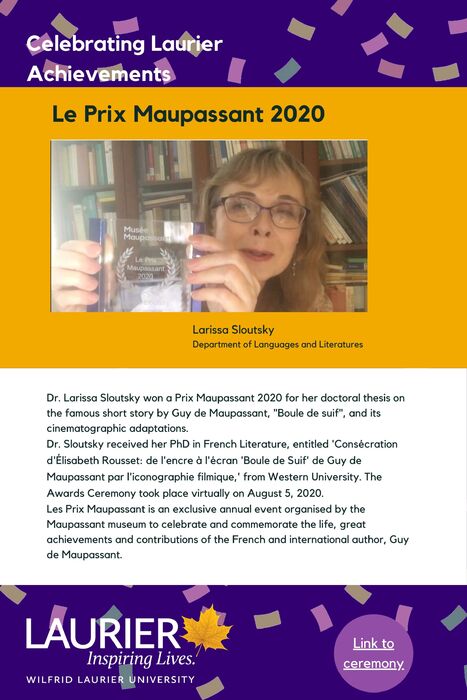 Le Prix Maupassant 2020
Le Prix Maupassant 2020 Dr. Larissa Sloutsky won a Prix Maupassant 2020 for her doctoral thesis on the famous short story by Guy de Maupassant, "Boule de suif", and its cinematographic adaptations.
Dr. Sloutsky received her PhD in French Literature, entitled 'Consécration d'Élisabeth Rousset: de l'encre à l'écran 'Boule de Suif' de Guy de Maupassant par l'iconographie filmique,' from Western University. The Awards Ceremony took place virtually on August 5, 2020.
Les Prix Maupassant is an exclusive annual event organised by the Maupassant museum to celebrate and commemorate the life, great achievements and contributions of the French and international author, Guy de Maupassant.
-
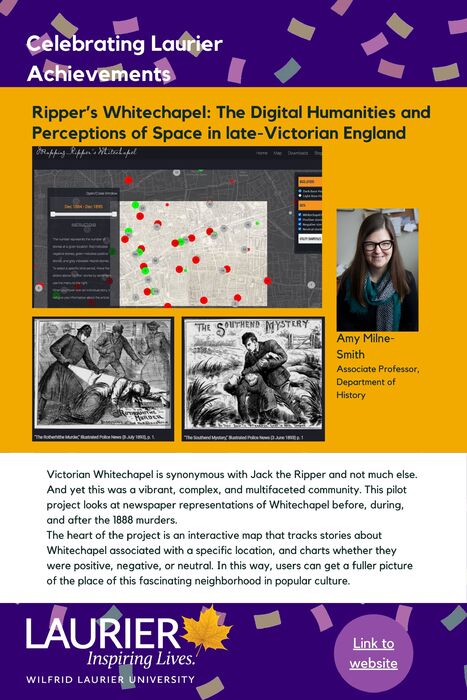 Ripper’s Whitechapel: The Digital Humanities and Perceptions of Space in late-Victorian England
Ripper’s Whitechapel: The Digital Humanities and Perceptions of Space in late-Victorian England Victorian Whitechapel is synonymous with Jack the Ripper and not much else. And yet this was a vibrant, complex, and multifaceted community. This pilot project looks at newspaper representations of Whitechapel before, during, and after the 1888 murders.
The heart of the project is an interactive map that tracks stories about Whitechapel associated with a specific location, and charts whether they were positive, negative, or neutral. In this way, users can get a fuller picture the place of this fascinating neighborhood in popular culture.
-
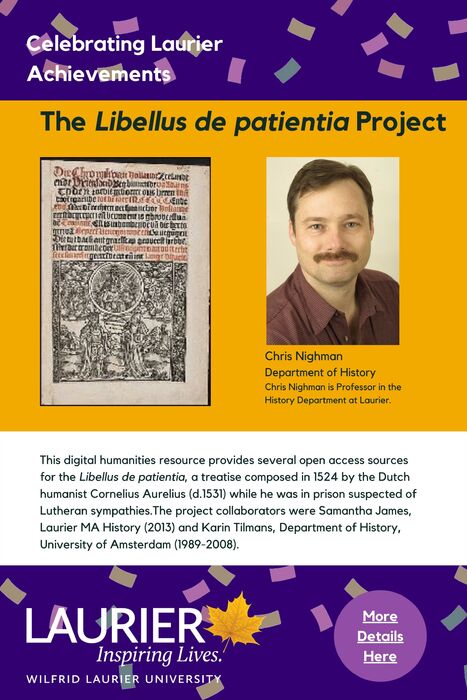 The Libellus de Patientia Project
The Libellus de Patientia Project This digital humanities resource provides several open access sources for the Libellus de patientia, a treatise composed in 1524 by the Dutch humanist Cornelius Aurelius (d.1531) while he was in prison suspected of Lutheran sympathies.
-
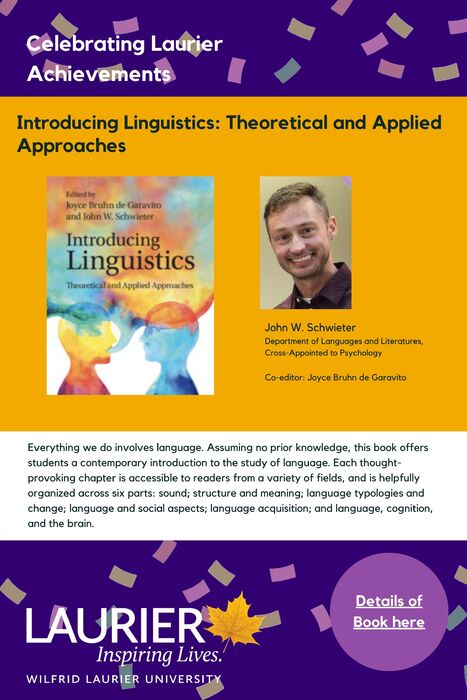 Keynote Address at The 7th International Conference on Cognitive Research on Translation and Interpreting
Keynote Address at The 7th International Conference on Cognitive Research on Translation and Interpreting
-
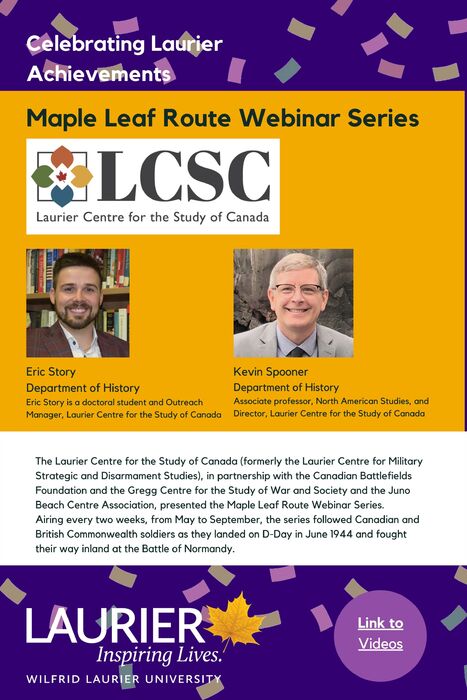 Maple Leaf Route Webinar Series
Maple Leaf Route Webinar Series The Laurier Centre for the Study of Canada (formerly the Laurier Centre for Military Strategic and Disarmament Studies), in partnership with the Canadian Battlefields Foundation and the Gregg Centre for the Study of War and Society and the Juno Beach Centre Association, presented the Maple Leaf Route Webinar Series.
Airing every two weeks, from May to September, the series followed Canadian and British Commonwealth soldiers as they landed on D-Day in June 1944 and fought their way inland at the Battle of Normandy.
-
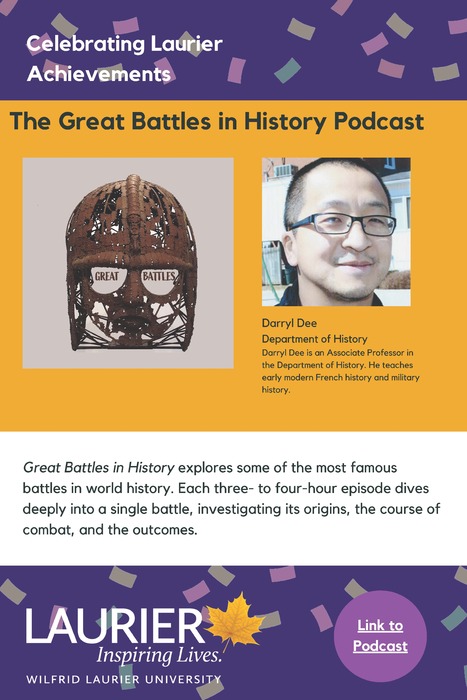 The Great Battles in History Podcast
The Great Battles in History Podcast Great Battles in History explores some of the most famous battles in world history. Each three- to four-hour episode dives deeply into a single battle, investigating its origins, the course of combat, and the outcomes.
-
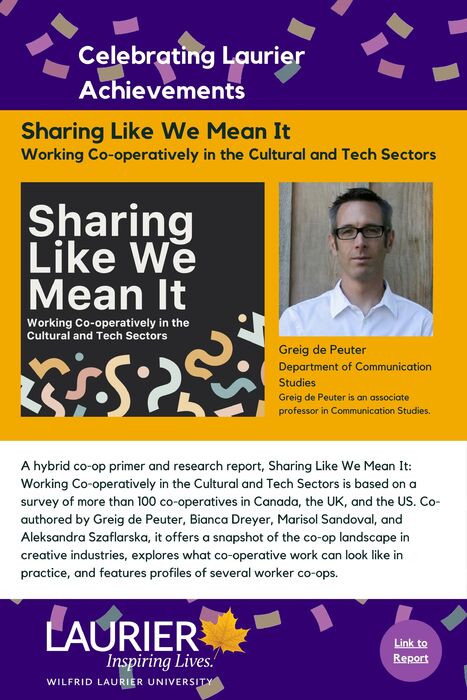 Sharing Like We Mean It Working Co-operatively in the Cultural and Tech Sectors
Sharing Like We Mean It Working Co-operatively in the Cultural and Tech Sectors A hybrid co-op primer and research report, Sharing Like We Mean It: Working Co-operatively in the Cultural and Tech Sectors is based on a survey of more than 100 co-operatives in Canada, the UK, and the US. It offers a snapshot of the co-op landscape in creative industries, explores what co-operative work can look like in practice, and features profiles of several worker co-ops.
-
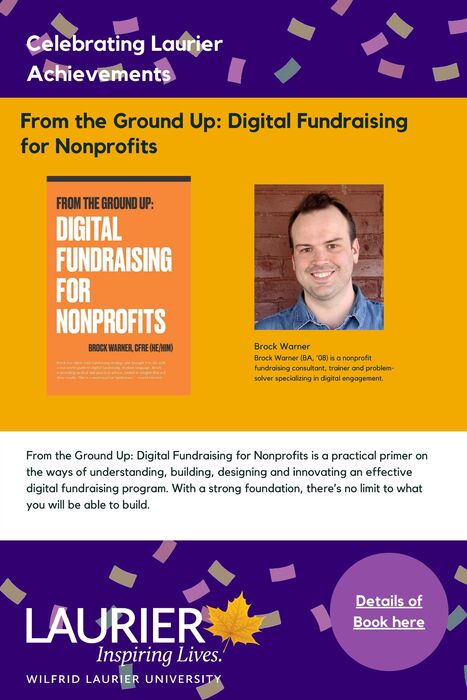 From the Ground Up: Digital Fundraising for Nonprofits
From the Ground Up: Digital Fundraising for Nonprofits From the Ground Up: Digital Fundraising for Nonprofits is a practical primer on the ways of understanding, building, designing and innovating an effective digital fundraising program. With a strong foundation, there’s no limit to what you will be able to build.
-
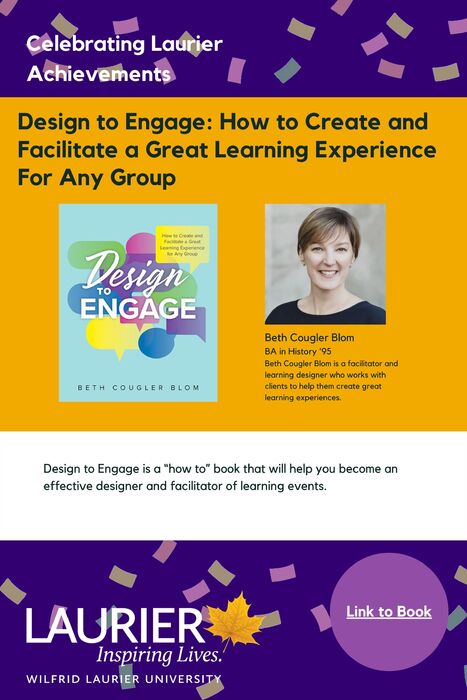 Design to Engage: How to Create and Facilitate a Great Learning Experience For Any Group
Design to Engage: How to Create and Facilitate a Great Learning Experience For Any Group Design to Engage is a “how to” book that will help you become an effective designer and facilitator of learning events.
-
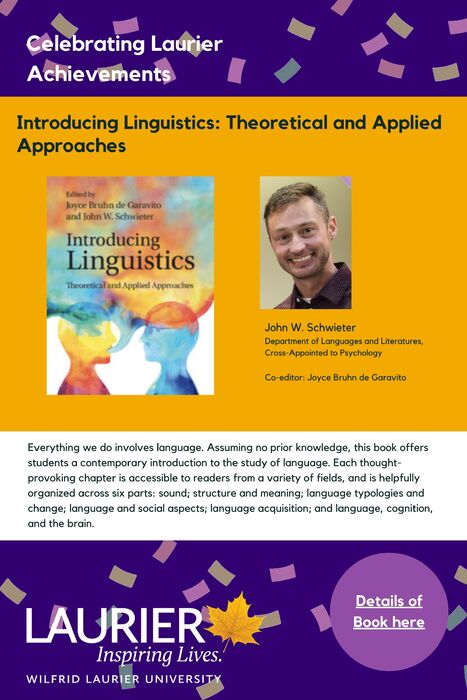 Introducing Linguistics: Theoretical and Applied Approaches
Introducing Linguistics: Theoretical and Applied Approaches Everything we do involves language. Assuming no prior knowledge, this book offers students a contemporary introduction to the study of language. Each thought-provoking chapter is accessible to readers from a variety of fields, and is helpfully organized across six parts: sound; structure and meaning; language typologies and change; language and social aspects; language acquisition; and language, cognition, and the brain.
-
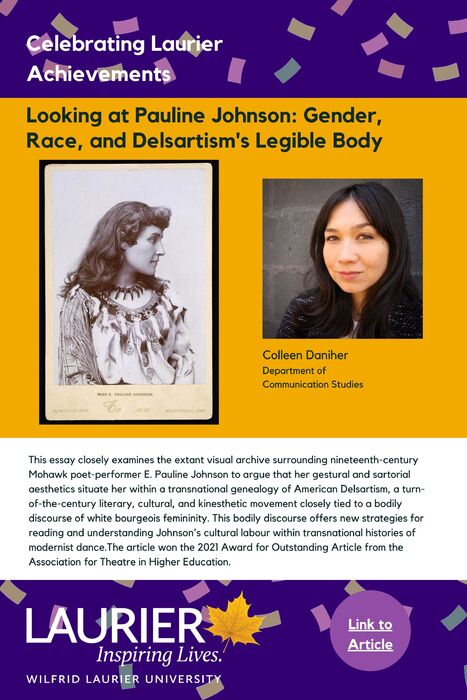 Looking at Pauline Johnson: Gender, Race, and Delsartism's Legible Body
Looking at Pauline Johnson: Gender, Race, and Delsartism's Legible Body This essay closely examines the extant visual archive surrounding nineteenth-century Mohawk poet-performer E. Pauline Johnson to argue that her gestural and sartorial aesthetics situate her within a transnational genealogy of American Delsartism, a turn-of-the-century literary, cultural, and kinesthetic movement closely tied to a bodily discourse of white bourgeois femininity. This bodily discourse offers new strategies for reading and understanding Johnson's cultural labour within transnational histories of modernist dance.The article won the 2021 Award for Outstanding Article from the Association for Theatre in Higher Education.
-
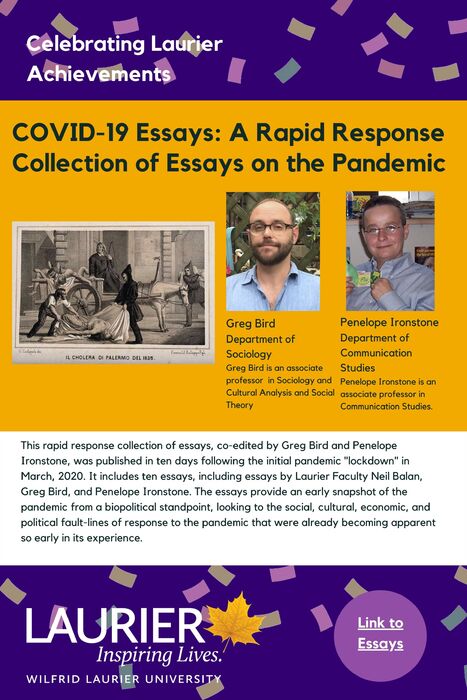 COVID-19 Essays: A Rapid Response Collection of Essays on the Pandemic
COVID-19 Essays: A Rapid Response Collection of Essays on the Pandemic This rapid response collection of essays, co-edited by Greg Bird and Penelope Ironstone, was published in 10 days following the initial pandemic "lockdown" in March, 2020. It includes 10 essays, including essays by Laurier Faculty Neil Balan, Greg Bird, and Penelope Ironstone. The essays provide an early snapshot of the pandemic from a biopolitical standpoint, looking to the social, cultural, economic, and political fault-lines of response to the pandemic that were already becoming apparent so early in its experience.
-
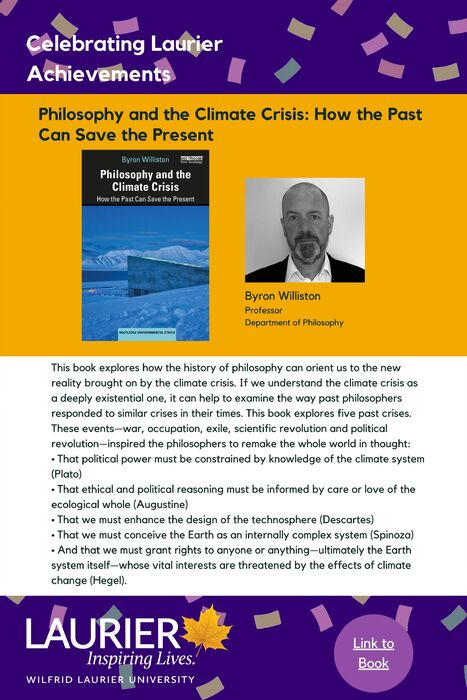 Philosophy and the Climate Crisis: How the Past Can Save the Present
Philosophy and the Climate Crisis: How the Past Can Save the Present This book explores how the history of philosophy can orient us to the new reality brought on by the climate crisis. If we understand the climate crisis as a deeply existential one, it can help to examine the way past philosophers responded to similar crises in their times. This book explores five past crises. These events—war, occupation, exile, scientific revolution and political revolution—inspired the philosophers to remake the whole world in thought:
• That political power must be constrained by knowledge of the climate system (Plato)
• That ethical and political reasoning must be informed by care or love of the ecological whole (Augustine)
• That we must enhance the design of the technosphere (Descartes)
• That we must conceive the Earth as an internally complex system (Spinoza)
• And that we must grant rights to anyone or anything—ultimately the Earth system itself—whose vital interests are threatened by the effects of climate change (Hegel).
-
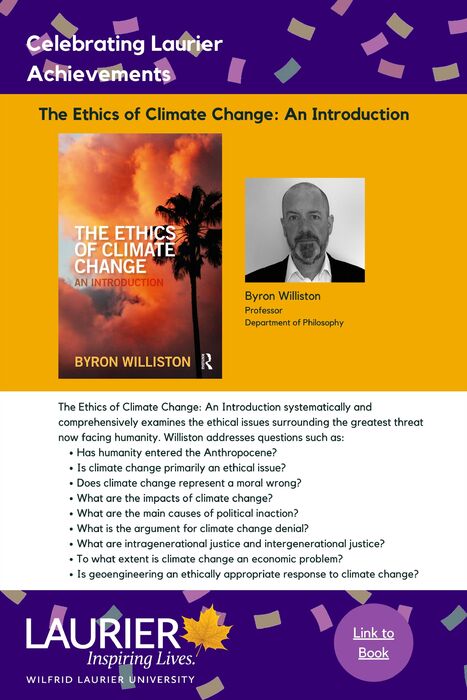 The Ethics of Climate Change: An Introduction
The Ethics of Climate Change: An Introduction The Ethics of Climate Change: An Introduction systematically and comprehensively examines the ethical issues surrounding the greatest threat now facing humanity. Williston addresses questions such as:
Has humanity entered the Anthropocene?
Is climate change primarily an ethical issue?
Does climate change represent a moral wrong?
What are the impacts of climate change?
What are the main causes of political inaction?
What is the argument for climate change denial?
What are intragenerational justice and intergenerational justice?
To what extent is climate change an economic problem?
Is geoengineering an ethically appropriate response to climate change?
-
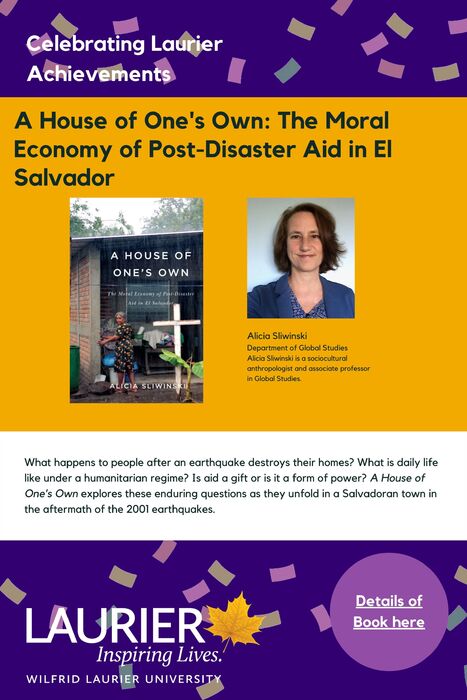 A House of One's Own: The Moral Economy of Post-Disaster Aid in El Salvador
A House of One's Own: The Moral Economy of Post-Disaster Aid in El Salvador What happens to people after an earthquake destroys their homes? What is daily life like under a humanitarian regime? Is aid a gift or is it a form of power? A House of One’s Own explores these enduring questions as they unfold in a Salvadoran town in the aftermath of the 2001 earthquakes.
-
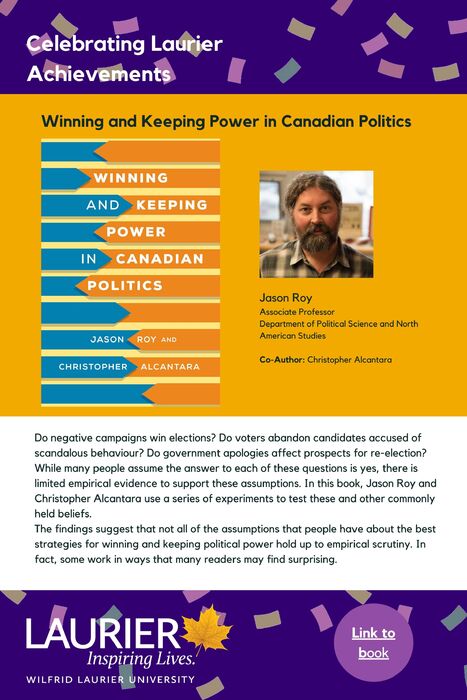 Winning and Keeping Power in Canadian Politics
Winning and Keeping Power in Canadian Politics Do negative campaigns win elections? Do voters abandon candidates accused of scandalous behaviour? Do government apologies affect prospects for re-election? While many people assume the answer to each of these questions is yes, there is limited empirical evidence to support these assumptions. In this book, Jason Roy and Christopher Alcantara use a series of experiments to test these and other commonly held beliefs.
The findings suggest that not all of the assumptions that people have about the best strategies for winning and keeping political power hold up to empirical scrutiny. In fact, some work in ways that many readers may find surprising.
-
New Perspectives on Thomas of Ireland’s Manipulus Florum / Nouvelles Perspectives sur le Manipulus Florum de Thomas d’Irlande
-
 Enemies of the State: The Radical Right in America from FDR to Trump
Enemies of the State: The Radical Right in America from FDR to Trump
-
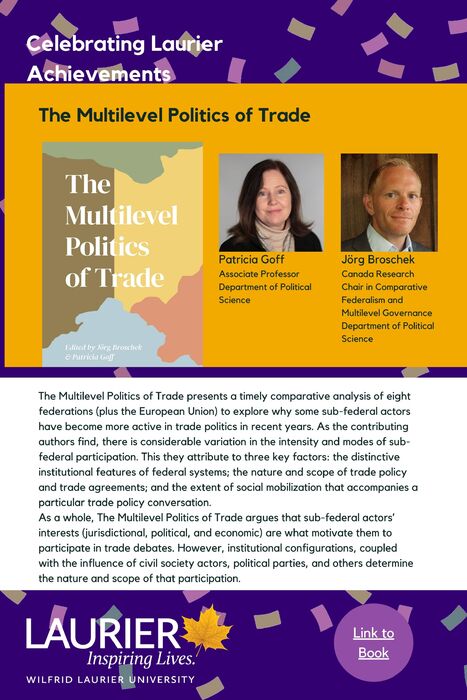 The Multilevel Politics of Trade
The Multilevel Politics of Trade The Multilevel Politics of Trade presents a timely comparative analysis of eight federations (plus the European Union) to explore why some sub-federal actors have become more active in trade politics in recent years. As the contributing authors find, there is considerable variation in the intensity and modes of sub-federal participation. This they attribute to three key factors: the distinctive institutional features of federal systems; the nature and scope of trade policy and trade agreements; and the extent of social mobilization that accompanies a particular trade policy conversation.
As a whole, The Multilevel Politics of Trade argues that sub-federal actors’ interests (jurisdictional, political, and economic) are what motivate them to participate in trade debates. However, institutional configurations, coupled with the influence of civil society actors, political parties, and others determine the nature and scope of that participation.
 The Changing Face of Iceland The Changing Face of Iceland, Mark Terry’s third film in a trilogy of documentaries examining the impacts of climate change on the polar regions, premiered at COP26 in Glasgow, Scotland on November 4, 2021, presented by The United Nations Framework Convention on Climate Change. Writer, Producer, and Director Dr. Mark Terry presented it to the world leaders, delegates, and press followed by a brief question period.
The Changing Face of Iceland The Changing Face of Iceland, Mark Terry’s third film in a trilogy of documentaries examining the impacts of climate change on the polar regions, premiered at COP26 in Glasgow, Scotland on November 4, 2021, presented by The United Nations Framework Convention on Climate Change. Writer, Producer, and Director Dr. Mark Terry presented it to the world leaders, delegates, and press followed by a brief question period. The Cultural Life of Drones: music and installation What does it mean to think of drones as culture? If culture is the range of social practices through which we come to understand and engage in our shared world, then drone cultures might be the myriad ways in which drones are embedded into our everyday lives as well as our fantasies about what kinds of lives that drones make.
The Cultural Life of Drones: music and installation What does it mean to think of drones as culture? If culture is the range of social practices through which we come to understand and engage in our shared world, then drone cultures might be the myriad ways in which drones are embedded into our everyday lives as well as our fantasies about what kinds of lives that drones make. Career Crossroads Getting to where you want to be in your career is not always as linear as we might think. Not everyone picks one career path and sticks to it for the rest of their lives, and lots of people are confused about what they want out of their career. On Career Crossroads, host Jonathan Collaton explores the stories of everyday people who have made pivots along their career journey. Starting with the question "what did you want to be when you grew up?", they discuss all the jobs they have had, the people that influenced them, and both the expected and unexpected decisions that led them to their present career.
Career Crossroads Getting to where you want to be in your career is not always as linear as we might think. Not everyone picks one career path and sticks to it for the rest of their lives, and lots of people are confused about what they want out of their career. On Career Crossroads, host Jonathan Collaton explores the stories of everyday people who have made pivots along their career journey. Starting with the question "what did you want to be when you grew up?", they discuss all the jobs they have had, the people that influenced them, and both the expected and unexpected decisions that led them to their present career. Hard Road to Victory: The Chatham All-Stars Story This historical nonfiction children's book tells the story of the 1934 Chatham All-Stars. This team of all-Black athletes competed for and won the Ontario baseball championships 13 years before Jackie Robinson broke the colour barrier.
Hard Road to Victory: The Chatham All-Stars Story This historical nonfiction children's book tells the story of the 1934 Chatham All-Stars. This team of all-Black athletes competed for and won the Ontario baseball championships 13 years before Jackie Robinson broke the colour barrier. Shadow Boxing and Other Bizarre Adventures of a Blind Girl When I was thirteen years old, I found out that I was slowly going blind. In 1999, I was diagnosed with a degenerative, genetic eye condition called Retinitis Pigmentosa. This condition will leave me mostly, if not completely, blind. As a teenager who felt I could see fine, going blind felt far away. Now, at age thirty-two, I have lost the majority of my peripheral vision and going blind feels anything but far away. If you are going blind and wonder how in the hell you are supposed to cope with this, my story is for you. If you love someone who is going blind and wish that you knew how to help in some way, my story is for you.
Shadow Boxing and Other Bizarre Adventures of a Blind Girl When I was thirteen years old, I found out that I was slowly going blind. In 1999, I was diagnosed with a degenerative, genetic eye condition called Retinitis Pigmentosa. This condition will leave me mostly, if not completely, blind. As a teenager who felt I could see fine, going blind felt far away. Now, at age thirty-two, I have lost the majority of my peripheral vision and going blind feels anything but far away. If you are going blind and wonder how in the hell you are supposed to cope with this, my story is for you. If you love someone who is going blind and wish that you knew how to help in some way, my story is for you. Older Sister. Not Necessarily Related Winner of the 2019 Hilary Weston Writers' Trust Prize for Nonfiction A beautiful and haunting memoir of kinship and culture rediscovered. Jenny Heijun Wills was born in Korea and adopted as an infant into a white family in small-town Canada. In her late twenties, she reconnected with her first family and returned to Seoul where she spent four months getting to know other adoptees, as well as her Korean mother, father, siblings, and extended family. Older Sister. Not Necessarily Related. describes in visceral, lyrical prose the painful ripple effects that follow a child's removal from a family, and the rewards that can flow from both struggle and forgiveness.
Older Sister. Not Necessarily Related Winner of the 2019 Hilary Weston Writers' Trust Prize for Nonfiction A beautiful and haunting memoir of kinship and culture rediscovered. Jenny Heijun Wills was born in Korea and adopted as an infant into a white family in small-town Canada. In her late twenties, she reconnected with her first family and returned to Seoul where she spent four months getting to know other adoptees, as well as her Korean mother, father, siblings, and extended family. Older Sister. Not Necessarily Related. describes in visceral, lyrical prose the painful ripple effects that follow a child's removal from a family, and the rewards that can flow from both struggle and forgiveness. Le Prix Maupassant 2020 Dr. Larissa Sloutsky won a Prix Maupassant 2020 for her doctoral thesis on the famous short story by Guy de Maupassant, "Boule de suif", and its cinematographic adaptations. Dr. Sloutsky received her PhD in French Literature, entitled 'Consécration d'Élisabeth Rousset: de l'encre à l'écran 'Boule de Suif' de Guy de Maupassant par l'iconographie filmique,' from Western University. The Awards Ceremony took place virtually on August 5, 2020. Les Prix Maupassant is an exclusive annual event organised by the Maupassant museum to celebrate and commemorate the life, great achievements and contributions of the French and international author, Guy de Maupassant.
Le Prix Maupassant 2020 Dr. Larissa Sloutsky won a Prix Maupassant 2020 for her doctoral thesis on the famous short story by Guy de Maupassant, "Boule de suif", and its cinematographic adaptations. Dr. Sloutsky received her PhD in French Literature, entitled 'Consécration d'Élisabeth Rousset: de l'encre à l'écran 'Boule de Suif' de Guy de Maupassant par l'iconographie filmique,' from Western University. The Awards Ceremony took place virtually on August 5, 2020. Les Prix Maupassant is an exclusive annual event organised by the Maupassant museum to celebrate and commemorate the life, great achievements and contributions of the French and international author, Guy de Maupassant. Ripper’s Whitechapel: The Digital Humanities and Perceptions of Space in late-Victorian England Victorian Whitechapel is synonymous with Jack the Ripper and not much else. And yet this was a vibrant, complex, and multifaceted community. This pilot project looks at newspaper representations of Whitechapel before, during, and after the 1888 murders. The heart of the project is an interactive map that tracks stories about Whitechapel associated with a specific location, and charts whether they were positive, negative, or neutral. In this way, users can get a fuller picture the place of this fascinating neighborhood in popular culture.
Ripper’s Whitechapel: The Digital Humanities and Perceptions of Space in late-Victorian England Victorian Whitechapel is synonymous with Jack the Ripper and not much else. And yet this was a vibrant, complex, and multifaceted community. This pilot project looks at newspaper representations of Whitechapel before, during, and after the 1888 murders. The heart of the project is an interactive map that tracks stories about Whitechapel associated with a specific location, and charts whether they were positive, negative, or neutral. In this way, users can get a fuller picture the place of this fascinating neighborhood in popular culture. The Libellus de Patientia Project This digital humanities resource provides several open access sources for the Libellus de patientia, a treatise composed in 1524 by the Dutch humanist Cornelius Aurelius (d.1531) while he was in prison suspected of Lutheran sympathies.
The Libellus de Patientia Project This digital humanities resource provides several open access sources for the Libellus de patientia, a treatise composed in 1524 by the Dutch humanist Cornelius Aurelius (d.1531) while he was in prison suspected of Lutheran sympathies. Keynote Address at The 7th International Conference on Cognitive Research on Translation and Interpreting
Keynote Address at The 7th International Conference on Cognitive Research on Translation and Interpreting  Maple Leaf Route Webinar Series The Laurier Centre for the Study of Canada (formerly the Laurier Centre for Military Strategic and Disarmament Studies), in partnership with the Canadian Battlefields Foundation and the Gregg Centre for the Study of War and Society and the Juno Beach Centre Association, presented the Maple Leaf Route Webinar Series. Airing every two weeks, from May to September, the series followed Canadian and British Commonwealth soldiers as they landed on D-Day in June 1944 and fought their way inland at the Battle of Normandy.
Maple Leaf Route Webinar Series The Laurier Centre for the Study of Canada (formerly the Laurier Centre for Military Strategic and Disarmament Studies), in partnership with the Canadian Battlefields Foundation and the Gregg Centre for the Study of War and Society and the Juno Beach Centre Association, presented the Maple Leaf Route Webinar Series. Airing every two weeks, from May to September, the series followed Canadian and British Commonwealth soldiers as they landed on D-Day in June 1944 and fought their way inland at the Battle of Normandy. The Great Battles in History Podcast Great Battles in History explores some of the most famous battles in world history. Each three- to four-hour episode dives deeply into a single battle, investigating its origins, the course of combat, and the outcomes.
The Great Battles in History Podcast Great Battles in History explores some of the most famous battles in world history. Each three- to four-hour episode dives deeply into a single battle, investigating its origins, the course of combat, and the outcomes. Sharing Like We Mean It Working Co-operatively in the Cultural and Tech Sectors A hybrid co-op primer and research report, Sharing Like We Mean It: Working Co-operatively in the Cultural and Tech Sectors is based on a survey of more than 100 co-operatives in Canada, the UK, and the US. It offers a snapshot of the co-op landscape in creative industries, explores what co-operative work can look like in practice, and features profiles of several worker co-ops.
Sharing Like We Mean It Working Co-operatively in the Cultural and Tech Sectors A hybrid co-op primer and research report, Sharing Like We Mean It: Working Co-operatively in the Cultural and Tech Sectors is based on a survey of more than 100 co-operatives in Canada, the UK, and the US. It offers a snapshot of the co-op landscape in creative industries, explores what co-operative work can look like in practice, and features profiles of several worker co-ops. From the Ground Up: Digital Fundraising for Nonprofits From the Ground Up: Digital Fundraising for Nonprofits is a practical primer on the ways of understanding, building, designing and innovating an effective digital fundraising program. With a strong foundation, there’s no limit to what you will be able to build.
From the Ground Up: Digital Fundraising for Nonprofits From the Ground Up: Digital Fundraising for Nonprofits is a practical primer on the ways of understanding, building, designing and innovating an effective digital fundraising program. With a strong foundation, there’s no limit to what you will be able to build. Design to Engage: How to Create and Facilitate a Great Learning Experience For Any Group Design to Engage is a “how to” book that will help you become an effective designer and facilitator of learning events.
Design to Engage: How to Create and Facilitate a Great Learning Experience For Any Group Design to Engage is a “how to” book that will help you become an effective designer and facilitator of learning events. Introducing Linguistics: Theoretical and Applied Approaches Everything we do involves language. Assuming no prior knowledge, this book offers students a contemporary introduction to the study of language. Each thought-provoking chapter is accessible to readers from a variety of fields, and is helpfully organized across six parts: sound; structure and meaning; language typologies and change; language and social aspects; language acquisition; and language, cognition, and the brain.
Introducing Linguistics: Theoretical and Applied Approaches Everything we do involves language. Assuming no prior knowledge, this book offers students a contemporary introduction to the study of language. Each thought-provoking chapter is accessible to readers from a variety of fields, and is helpfully organized across six parts: sound; structure and meaning; language typologies and change; language and social aspects; language acquisition; and language, cognition, and the brain. Looking at Pauline Johnson: Gender, Race, and Delsartism's Legible Body This essay closely examines the extant visual archive surrounding nineteenth-century Mohawk poet-performer E. Pauline Johnson to argue that her gestural and sartorial aesthetics situate her within a transnational genealogy of American Delsartism, a turn-of-the-century literary, cultural, and kinesthetic movement closely tied to a bodily discourse of white bourgeois femininity. This bodily discourse offers new strategies for reading and understanding Johnson's cultural labour within transnational histories of modernist dance.The article won the 2021 Award for Outstanding Article from the Association for Theatre in Higher Education.
Looking at Pauline Johnson: Gender, Race, and Delsartism's Legible Body This essay closely examines the extant visual archive surrounding nineteenth-century Mohawk poet-performer E. Pauline Johnson to argue that her gestural and sartorial aesthetics situate her within a transnational genealogy of American Delsartism, a turn-of-the-century literary, cultural, and kinesthetic movement closely tied to a bodily discourse of white bourgeois femininity. This bodily discourse offers new strategies for reading and understanding Johnson's cultural labour within transnational histories of modernist dance.The article won the 2021 Award for Outstanding Article from the Association for Theatre in Higher Education. COVID-19 Essays: A Rapid Response Collection of Essays on the Pandemic This rapid response collection of essays, co-edited by Greg Bird and Penelope Ironstone, was published in 10 days following the initial pandemic "lockdown" in March, 2020. It includes 10 essays, including essays by Laurier Faculty Neil Balan, Greg Bird, and Penelope Ironstone. The essays provide an early snapshot of the pandemic from a biopolitical standpoint, looking to the social, cultural, economic, and political fault-lines of response to the pandemic that were already becoming apparent so early in its experience.
COVID-19 Essays: A Rapid Response Collection of Essays on the Pandemic This rapid response collection of essays, co-edited by Greg Bird and Penelope Ironstone, was published in 10 days following the initial pandemic "lockdown" in March, 2020. It includes 10 essays, including essays by Laurier Faculty Neil Balan, Greg Bird, and Penelope Ironstone. The essays provide an early snapshot of the pandemic from a biopolitical standpoint, looking to the social, cultural, economic, and political fault-lines of response to the pandemic that were already becoming apparent so early in its experience. Philosophy and the Climate Crisis: How the Past Can Save the Present This book explores how the history of philosophy can orient us to the new reality brought on by the climate crisis. If we understand the climate crisis as a deeply existential one, it can help to examine the way past philosophers responded to similar crises in their times. This book explores five past crises. These events—war, occupation, exile, scientific revolution and political revolution—inspired the philosophers to remake the whole world in thought: • That political power must be constrained by knowledge of the climate system (Plato) • That ethical and political reasoning must be informed by care or love of the ecological whole (Augustine) • That we must enhance the design of the technosphere (Descartes) • That we must conceive the Earth as an internally complex system (Spinoza) • And that we must grant rights to anyone or anything—ultimately the Earth system itself—whose vital interests are threatened by the effects of climate change (Hegel).
Philosophy and the Climate Crisis: How the Past Can Save the Present This book explores how the history of philosophy can orient us to the new reality brought on by the climate crisis. If we understand the climate crisis as a deeply existential one, it can help to examine the way past philosophers responded to similar crises in their times. This book explores five past crises. These events—war, occupation, exile, scientific revolution and political revolution—inspired the philosophers to remake the whole world in thought: • That political power must be constrained by knowledge of the climate system (Plato) • That ethical and political reasoning must be informed by care or love of the ecological whole (Augustine) • That we must enhance the design of the technosphere (Descartes) • That we must conceive the Earth as an internally complex system (Spinoza) • And that we must grant rights to anyone or anything—ultimately the Earth system itself—whose vital interests are threatened by the effects of climate change (Hegel). The Ethics of Climate Change: An Introduction The Ethics of Climate Change: An Introduction systematically and comprehensively examines the ethical issues surrounding the greatest threat now facing humanity. Williston addresses questions such as: Has humanity entered the Anthropocene? Is climate change primarily an ethical issue? Does climate change represent a moral wrong? What are the impacts of climate change? What are the main causes of political inaction? What is the argument for climate change denial? What are intragenerational justice and intergenerational justice? To what extent is climate change an economic problem? Is geoengineering an ethically appropriate response to climate change?
The Ethics of Climate Change: An Introduction The Ethics of Climate Change: An Introduction systematically and comprehensively examines the ethical issues surrounding the greatest threat now facing humanity. Williston addresses questions such as: Has humanity entered the Anthropocene? Is climate change primarily an ethical issue? Does climate change represent a moral wrong? What are the impacts of climate change? What are the main causes of political inaction? What is the argument for climate change denial? What are intragenerational justice and intergenerational justice? To what extent is climate change an economic problem? Is geoengineering an ethically appropriate response to climate change? A House of One's Own: The Moral Economy of Post-Disaster Aid in El Salvador What happens to people after an earthquake destroys their homes? What is daily life like under a humanitarian regime? Is aid a gift or is it a form of power? A House of One’s Own explores these enduring questions as they unfold in a Salvadoran town in the aftermath of the 2001 earthquakes.
A House of One's Own: The Moral Economy of Post-Disaster Aid in El Salvador What happens to people after an earthquake destroys their homes? What is daily life like under a humanitarian regime? Is aid a gift or is it a form of power? A House of One’s Own explores these enduring questions as they unfold in a Salvadoran town in the aftermath of the 2001 earthquakes. Winning and Keeping Power in Canadian Politics Do negative campaigns win elections? Do voters abandon candidates accused of scandalous behaviour? Do government apologies affect prospects for re-election? While many people assume the answer to each of these questions is yes, there is limited empirical evidence to support these assumptions. In this book, Jason Roy and Christopher Alcantara use a series of experiments to test these and other commonly held beliefs. The findings suggest that not all of the assumptions that people have about the best strategies for winning and keeping political power hold up to empirical scrutiny. In fact, some work in ways that many readers may find surprising.
Winning and Keeping Power in Canadian Politics Do negative campaigns win elections? Do voters abandon candidates accused of scandalous behaviour? Do government apologies affect prospects for re-election? While many people assume the answer to each of these questions is yes, there is limited empirical evidence to support these assumptions. In this book, Jason Roy and Christopher Alcantara use a series of experiments to test these and other commonly held beliefs. The findings suggest that not all of the assumptions that people have about the best strategies for winning and keeping political power hold up to empirical scrutiny. In fact, some work in ways that many readers may find surprising. Enemies of the State: The Radical Right in America from FDR to Trump
Enemies of the State: The Radical Right in America from FDR to Trump  The Multilevel Politics of Trade The Multilevel Politics of Trade presents a timely comparative analysis of eight federations (plus the European Union) to explore why some sub-federal actors have become more active in trade politics in recent years. As the contributing authors find, there is considerable variation in the intensity and modes of sub-federal participation. This they attribute to three key factors: the distinctive institutional features of federal systems; the nature and scope of trade policy and trade agreements; and the extent of social mobilization that accompanies a particular trade policy conversation. As a whole, The Multilevel Politics of Trade argues that sub-federal actors’ interests (jurisdictional, political, and economic) are what motivate them to participate in trade debates. However, institutional configurations, coupled with the influence of civil society actors, political parties, and others determine the nature and scope of that participation.
The Multilevel Politics of Trade The Multilevel Politics of Trade presents a timely comparative analysis of eight federations (plus the European Union) to explore why some sub-federal actors have become more active in trade politics in recent years. As the contributing authors find, there is considerable variation in the intensity and modes of sub-federal participation. This they attribute to three key factors: the distinctive institutional features of federal systems; the nature and scope of trade policy and trade agreements; and the extent of social mobilization that accompanies a particular trade policy conversation. As a whole, The Multilevel Politics of Trade argues that sub-federal actors’ interests (jurisdictional, political, and economic) are what motivate them to participate in trade debates. However, institutional configurations, coupled with the influence of civil society actors, political parties, and others determine the nature and scope of that participation.